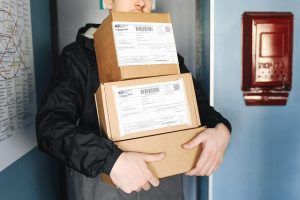By Justin Bean
Holiday shopping is showing no signs of slowing down this year – in fact, it’s accelerating. Despite inflation and high interest rates, the National Retail Federation expects holiday sales to be strong, beating 2021 sales by 6-8%. This amounts to somewhere between $942 and $960 billion more spent this year. The average annual growth rate for retail sales over the last 10 years is 4.9%, but spending during and after the pandemic has been above average.
But how sustainable are the holidays and can we really keep up with expectations for infinite growth? Even today retailers are struggling to keep up with demand and expectations. Supply chain disruptions hit their worst point in 50 years, still haven’t recovered and are not expected to recover for at least another year, thanks to the ongoing ripples from the pandemic, the decoupling of US and China relations, and the war in Ukraine. Add to this that weather disruptions and disasters are increasing in frequency and intensity, and retailers are facing a perfect storm. So are we entering an era of long term-shortages, inflation, and declining abundance? Not necessarily.
What we are living through is a global transition, from analog to digital, and from a fragile, dirty economy to one that is resilient and sustainable. This transition has become a necessity for exactly the same types of reasons that are causing the shortages and inflation we see today – climate change, geopolitical volatility, and the need to keep business going in a world of crisis and change.
Investors and customers are also pressuring companies (including retailers) to shift to more sustainable products and services. This is partially due to valid concerns about protecting our ecosystems and planet, but it is also just calling for good business, especially in the case of investors. Building antifragile supply chains will help retailers prepare for and become resilient in the face of the next disruptions, whether they be more pandemics, weather-related disasters, or political skirmishes in supplier regions – or in the worst case, all of the above.
Offering sustainable products and services will fulfill consumer’s desires for more responsible consumption. Over 42% of the US population are now Gen Z or Millennials, and this group of customers strongly prefer sustainable products and services. In fact, 75% of GenZ says that even more important than brand is sustainability. Millennials prefer sustainability when shopping in the same proportion. In aggregate over the last 5 years, 85% of customers have become more sustainable. There is an enormous opportunity for retailers who are able to credibly offer these sustainable products to their customers. The ethical fashion market opportunity is projected to reach $10B by 2025 for example, but even by changing over the existing offerings to more sustainable products can differentiate a company and position it ahead of its competitors for better performance. Those who don’t may face harsh blowback on social media and even the most prestigious brands today could easily fall from grace in the future if they don’t address sustainability and ethics.
Thankfully there is a proliferation of solutions in the market to help companies to measure and improve their emissions. Some manufacturers are switching to renewable energy to power their activities. Apple is one company that announced that all energy would be sourced from renewables by 2030, including all of its supply chain (scope 3) emissions. While this shows great leadership, companies need to also think about the process emissions coming from their suppliers. Platforms like Ecovadis, Circulor, Assent, and SupplyShift are ramping up to serve the needs of these companies as reporting regulations (such as those announced by the SEC) begin to rear their head.
Many companies are proactively announcing their efforts, and some are simply “greenwashing”, unfortunately. In our time of increased scrutiny thanks to the ubiquity of information available on the Internet and social media, those who greenwash will likely be exposed relatively quickly and it is not guaranteed that consumers will forgive them, especially younger ones. This dynamic has recently led to another phenomenon: “greenhushing.” This is when a company may have legitimate actions and performance on ESG and sustainability metrics, but is so cautious about announcing these activities due to concerns of being labeled a greenwasher and slandered on social media. While understandable in today’s volatile age, greenhushing could actually hinder commitments and progress on sustainability. We should continue to scrutinize announcements, but we should also celebrate genuine progress.
But what can we do as consumers? We can start by making our purchases wisely. Many products will make their packaging look “green” by including pictures of trees and leaves, but knowing a few certifications can go a long way to ensure that we are really purchasing sustainable products. Look out for EPEAT and EnergySTAR for electronics, USDA Organic Certified for foods, Global Organic Textile Standard, Oeko-Tex Standards, Bluesign Approved, Responsible Down and Wool Standards for clothing, and catch-alls like Rainforest Alliance Certified, Certified B Corporations. We can also shop earlier (much to the chagrin of us last-minute shoppers out there) and choose ground shipping instead of air in order to reduce the carbon footprint of our purchases. Our dollars are our vote in the marketplace – let’s use them to support the companies making the right choice.
So as retail sales continue to climb, let’s ensure we still enable abundance over the short, and long term. As consumers we can make choices about what we buy. As retailers we can get a head start on transitioning our supply chains to ones that are sustainable and resilient. Generations, and balance sheets of the future will surely thank us
About the author

Justin Bean is an impact-focused tech executive who has worked with Fortune 500s, Silicon Valley startups, and non- profit organizations to achieve triple-bottom-line (people, planet, profit) results, as an intrapreneur, consultant, mentor, and thought leader. He has authored many syndicated articles and has been interviewed by the New York Times, The Hill, VERDICT, NBC, South China Morning Post, and others on topics ranging from smart cities, sustainable technology, AI and IoT, and industry solutions to combat the COVID-19 pandemic, climate change, and social disarray. He holds an MBA in Sustainable Management and BS in Sociology with minors in Economics and Business. Working in Sustainability Strategy and Solution Innovation at Hitachi, he is the author of the upcoming book What Could Go Right: Designing Our Ideal Future to Emerge from Continual Crises to a Thriving World
Related Articles

How to Manage Your Amazon Seller Account Effectively in 2026?
Learn key strategies for managing your Amazon seller account in 2026, including listing optimization, account health management, inventory control, and advertising.

Transaction-Level Data Is Raising the Bar for Attribution and Accountability
For retailers building or scaling retail media and broader commerce marketing programs, this shift reshapes how audiences should be built and forces a more disciplined approach to transparency and cross-channel accountability.

How Rising Consent Awareness Is Reshaping Customer Experience, Data Quality, and Campaign Performance
It also revealed that another 35% expect to deploy personalized AI recommendations in the next year, as AI moves from pilots into the heart of omnichannel journeys, search and merchandising.

5 Strategies for Scaling BOPIS Operations During Holiday Peak Season
Companies across various sectors are leveraging automation to enhance in-store experiences and improve customer satisfaction, including within BOPIS systems. It is shown to bolster productivity and decision-making, too.


 for the latest news and job opportunities in retail tech
for the latest news and job opportunities in retail tech 